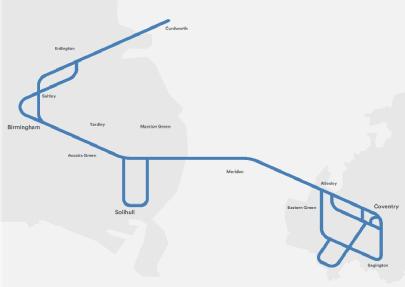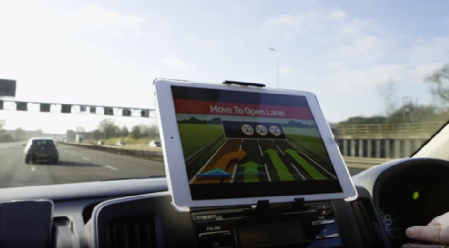WMG News
Work begins on autonomous vehicle trial route
Work has begun on the 300km Midlands Future Mobility test environment - spanning from Coventry to Birmingham, which will see autonomous  vehicles trialled on urban, rural, suburban and highway roads. The project is run by a consortium of companies including WMG, MIRA, Transport for West Midlands, Costain, Amey, Wireless Infrastructure Group, Vodafone, Coventry University and Highways England.
vehicles trialled on urban, rural, suburban and highway roads. The project is run by a consortium of companies including WMG, MIRA, Transport for West Midlands, Costain, Amey, Wireless Infrastructure Group, Vodafone, Coventry University and Highways England.
The autonomous vehicle industry is estimated to be worth up to £62bn to the UK economy by 2030, and hoping to lead the way to autonomous vehicles is the West Midlands, as WMG, University of Warwick begins work on autonomous vehicle testing routes.
Autonomous vehicles will be trialled along the Midlands Future Mobility route, the route has been developed by TfWM in collaboration with Coventry City Council, Birmingham City Council and Solihull Council and provides over 300km of inner city, suburban and rural roads from Coventry to Birmingham, on which to fully assess vehicle performance in a wide range of real world locations and situations.
The first types of vehicle to be trialled along the route will be “connected” vehicles. Connected vehicles can ‘talk’ to each other and warn of traffic, crashes and other hazards that other connected vehicles may have seen or be heading towards.
The vehicles on the Midlands Future Mobility route will not be driving themselves during the early stages of research, initially they will have a driver and occasionally a second person monitoring how the vehicles are working. All testing will be as safe if not safer than current vehicles on the road.
The route includes infrastructure such as smart CCTV, weather stations, communications units, and highly accurate GPS.
In the future autonomous vehicles will be trialled on the route, however these will also be closely monitored by safety operators ready to take over immediately in the event of a problem. These autonomous vehicles will appear gradually as more and more advanced “Driver Assistance” systems are tested paving the way, such as lane centring and auto-speed limiting technology.
The route itself causes no disruption to drivers or the homes along it, as it uses existing road infrastructure 95% of the time. Phase one of the route includes the University of Warwick, Coventry ring road, roads in Meriden, Solihull and central Birmingham around the Jewellery Quarter.
Later this year the route will be extended to include rural and highway roads and span up to 350km.
Project consortium member Costain and contractor Siemens Mobility have begun work on the route, which will officially open for trials later this year. Both firms, are of course, practicing social distancing in the construction of important technical features such as CCTV networks along the route.
John Fox, Project Director, Midlands Future Mobility comments: 
“It is great to see that work has begun in making roads a more connected place, where drivers can make their journeys more safely and where goods can be delivered more efficiently.
“The West Midlands has a rich history of the automotive industry, and to see it is now progressing into Autonomous vehicles feels somewhat momentous.”
Mayor of the West Midlands Andy Street, who leads TfWM, said: “Connected and autonomous vehicle technology has the potential to radically change our lives, and I am pleased the West Midland is leading the way in this sector with research facilities and production plants already in place.
“I am determined our region will become a global leader in electric and autonomous vehicle technology, as I know we have the skills, facilities, and drive to compete with any other city or region in the world.
“Seeing our roads being used as a test bed for this new technology is both exciting and a step forward, and this vital research will help pave the way to bring key investment and jobs to the region as we look to bounce back from the COVID-19 crisis.”
John Batterbee, Technology Solutions Director, Costain Group comments:
“At Costain we’re excited about how our ambitious work together with our market leading partners in the Midlands is enabling safer, cleaner and faster journeys. Today is a key milestone in starting to deploy the advanced infrastructure technologies we’ve developed over the last couple of years that are putting the UK at the forefront of the global mobility revolution. The cameras and video analytics we’re deploying will, for example, save lives by enabling drivers to be alerted to hazards beyond the line of sight.”
Wilke Reints, Managing Director of Intelligent Traffic Systems for Siemens Mobility in the UK, comments:
“We are proud to have been contracted to undertake work on this project. With CAVs offering huge potential to improve safety, reduce congestion and help optimise traffic flow, this project is a further demonstration of the UK’s capabilities in this exciting and fast-moving sector. It allows us collectively to demonstrate how smart technology enables vehicles to be connected via high-speed, high-capacity wireless infrastructure across a whole road network.”
WMG to lead new £11 million programme partnering with Highways England to evaluate connected and autonomous vehicles
WMG, at the University of Warwick, is leading a new £11 million programme to evaluate connected and autonomous vehicles which will work with a range of partners including Highways England. It further establishes Coventry, Warwickshire and the West Midlands as the heart of connected and autonomous vehicles research and development in the UK.
The £11 million Meridian 3 programme is funded by Innovate UK and brings together Highways England with Midlands Future Mobility, which is led by WMG at the University of Warwick.
This addition to the Midlands Future Mobility project will enable connected and autonomous vehicle technologies, that have been developed using simulation and test tracks, to then be evaluated on roads in real-world driving situations, providing invaluable additional learning that will enable them to become a commercially viable and desirable means of road-transport.
Midlands Future Mobility in the driving seat to transform the environment for connected vehicles
 Midlands Future Mobility will use over 50 miles of Coventry and Birmingham roads to establish the Midlands as a world class UK centre for the development, and evaluation of, connected and autonomous vehicles (CAV) and related technologies and services.
Midlands Future Mobility will use over 50 miles of Coventry and Birmingham roads to establish the Midlands as a world class UK centre for the development, and evaluation of, connected and autonomous vehicles (CAV) and related technologies and services.
Midlands Future Mobility will be at the heart of the UK’s transport network, making a significant contribution to the UK’s national transport strategy, and will play a crucial role in shaping the transport sector. It will firmly establish the UK’s presence in the connected and autonomous vehicle market, and contribute to the UK’s Industrial Strategy.
The specially selected networked roads cover a range of representative areas and will be the largest, most diverse testing environment in the UK, with the deployment of new roadside infrastructure including smart vehicle monitoring, data analytics and 5G ready wireless infrastructure. By using real-world environments Midlands Future Mobility will enable a variety of industries to test new vehicle technologies and services, with the aim of improving integration.
